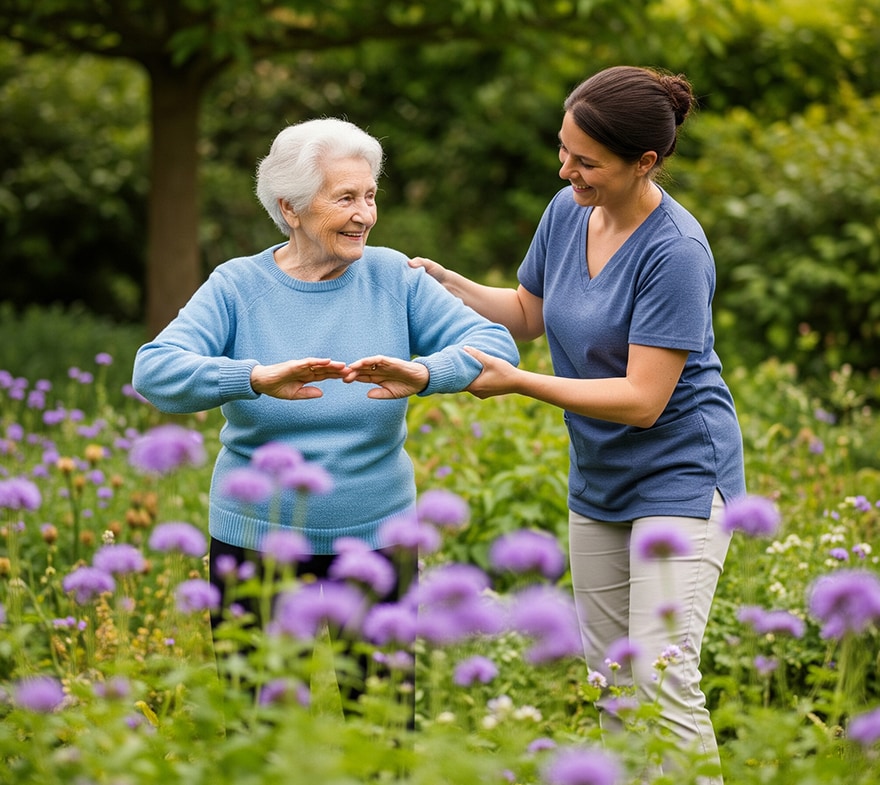Enriching Well-Being with Comfort & Convenience
At The McKendree, we believe that a truly fulfilling life is one where your well-being is front and center, and every day is filled with opportunities for joy, connection, and ease. Our Hermitage community is thoughtfully appointed with programs and amenities designed to nurture your mind, body, and spirit, all while providing a touch of that delightful Nashville-area convenience. Whether it is with our calendar of events in our neighborhood or in and around Hermitage, we’re here to offer an experience where you can feel your best, engage your passions, and truly savor each moment.
How Do We
Enrich Life?
Our unique programs—EngageLife, Flavorful, Vitality, and Tranquility—are crafted to add meaning, connection, and ease to everyday moments.
From discovering new passions and building relationships to enjoying peaceful relaxation, these experiences are designed to make each day fulfilling and enjoyable.
Let’s create moments worth cherishing.

Our Signature Approach
We’ve poured our hearts into developing a unique suite of signature programs, each carefully crafted to bring more vitality, connection, and pleasure into the daily lives of our residents.
EngageLife
Events & Activities
Get ready for a calendar brimming with excitement!
Whether you’re expressing your artistic side, joining our resident choir for a song, staying active with friends, enjoying live performances, or exploring the best of Hermitage and Nashville, EngageLife is designed to fill your days with purpose and fun.
Flavorful
Dining Experiences
Prepare your palate for a delightful culinary journey with our Flavorful dining program. We believe that wonderful food is a cornerstone of a happy life.
Served in a warm, inviting atmosphere, every meal is an opportunity for good conversation and satisfying flavors that nourish both body and soul.
Vitality
Health & Wellness
Ready to embrace an active and energized lifestyle? Our Vitality program offers welcoming and adaptable ways to maintain your strength, flexibility, and overall well-being.
Vitality supports your personal wellness goals with an encouraging and friendly approach, helping you feel fabulous every day.
Tranquility
Salon & Styling
Indulge in a little well-deserved pampering at our on-site Tranquility Salon.
Our stylists are here to provide convenient, professional services that will leave you looking and feeling radiant and ready to take on the day.

Our Commitment to Safety & Security
At The McKendree, safety and peace of mind are our top priorities, ensuring our residents can fully enjoy all that our community has to offer.
We’ve thoughtfully designed our spaces to be accessible, with wheelchair-friendly layouts and secure handrails to promote mobility and independence. Our team is available 24/7, supported by reliable emergency response systems, so help is always just a step away.
Live confidently and comfortably at The McKendree.
Services & Amenities That Elevate Daily Life
Beyond our signature programs, The McKendree is thoughtfully equipped with an extensive array of amenities and services, all designed to make your life in Hermitage more comfortable, convenient, and wonderfully peaceful. We’ve taken care of the details so you can focus on enjoying every moment.
Our community features and services include:
- Cozy library and a comfortable lounge for relaxation and entertainment
- Delicious, restaurant-style meals from our Flavorful dining approach
- Regular housekeeping and laundry services for a truly relaxed lifestyle
- A bustling EngageLife calendar packed with social activities and exciting outings
- Helpful concierge services to assist with your personal needs
- Complete interior and exterior home maintenance—leave the upkeep to us!
- Access to continued health services and continuity of care for your peace of mind
- Convenient on-site Tranquility beauty salon and barbershop
- A safe and secure setting with dedicated 24-hour staffing
- Comfortable accommodations that you can personalize to your taste
- Reliable medication management services
- Ample resident parking and available transportation
- Respectful assistance with bathing, dressing, cooking, and other personal care needs
- Specialized Vitality fitness programming
- Creative arts and crafts center to explore your talents
- Beautifully landscaped grounds with courtyards and outdoor common areas
- Complimentary parking for guests
- Easy access to Nashville—only 25 minutes away!
Embrace a Life of Enrichment in Hermitage
At The McKendree, we are committed to providing a setting where you can truly flourish.
We invite you to explore our diverse programs and extensive amenities, all thoughtfully designed to support your well-being and enhance your enjoyment of life in our welcoming community near Nashville.

